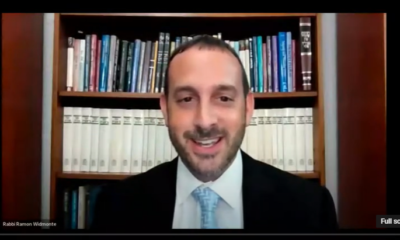
Featured Item

Is there a benefit to online learning?
Online educational platforms and resources have made teaching and learning no longer purely classroom based. But just how are students and schools navigating the opportunities this brings?
Though online innovation has long offered an extension to traditional teaching and learning, there’s no doubt that the move to blended learning was accelerated by the COVID-19 pandemic. Today, classroom learning is complemented by rapidly evolving online tools, inevitably changing the face of education.
Rabbi Ricky Seeff, the general director of the South African Board of Jewish Education, believes that the potential this shift offers is one schools should maximise. “Post the pandemic, King David gave serious thought to how we could leverage the now pervasive online world to improve our students’ learning,” he says.
“We created our online platform, KDX, to assist students who needed help and extend those who needed extension through what we called “Learning Beyond the Classroom”. KDX has resources for online clinics, masterclasses, past papers, and video tutorials.”
In a pilot phase, this platform is for high school students only but there are plans to include the primary schools and to offer a parent platform, providing information and guidance, says Seeff.
Yet, no matter how much they may embrace a blended learning approach, for King David schools, face-to-face learning remains the gold standard when it comes to education. “This isn’t just from an information-transfer perspective, but from a holistic emotional and social perspective,” says Seeff. “Online should always be supplementary and not primary. KDX is the balance: face-to-face learning supplemented by support and extension online.”
Some students respond better to an online learning environment. While they may attend traditional schools, they’re using the internet to find ways to understand concepts they may not grasp in class. This is the case for David Hurwitz*, currently a matric student at King David High School Victory Park, who last year used YouTube to supplement his exam preparation.
“I’d been a little irresponsible with focusing and taking notes in maths class,” he admits. “I was quite far behind where I needed to be.” He acknowledges that he could have asked his teacher for more input, but Hurwitz is shy, and preferred to turn to YouTube, where he searched for videos on the sections he missed. “I found a really good YouTube channel which had videos from maths teachers who helped me a lot,” he says.
Though he says you can never be 100% sure that you have found something reputable on the internet, he’d learned enough in class to know that the channel had the right information. “A lot of what I learned there encapsulated even more than I needed to know for the syllabus.They explained it very well. I also find it very easy to learn through videos, it’s all just there, and you can rewind if you need to.” Hurwitz, a high achiever, particularly excelled in the sections he’d learned online. “If I was at school before the age of YouTube and all this information online, I honestly don’t know what I would have done,” he says. “It’s great to have this option as well.”
Like King David, Yeshiva College is working to incorporate online resources into its teaching methodologies, says Rob Long, the school’s director of academics. “Teachers give students websites to consult just as in the past we used to give the kids readings so we would encourage that extra work,” Long says. “We also use Google Classroom, where teachers post links and resources. We need to embrace the technology and teach children how to use it responsibly.”
There may be different opinions espoused online on a particular subject like history, for example, and here students are taught to think critically. “The whole idea of reliability is taught in class,” says Long. How do you find reliable sources and how do you determine if a source is credible or not? That’s a critical skill for our children right now.”
Further embracing technology, Yeshiva has this year teamed up with Evolve Online School to offer registered students additional subjects online. “We’ve become what we call a mixed-provider school,” Long says. “Children come to school and do face-to-face learning with their teachers but during certain periods they’re potentially on this online learning platform doing different subjects. For example, when most of the class goes into the history classroom, a few will do geography online from our computers with external Evolve teachers.”
Another issue when it comes to using online resources, is the risk that kids will use tools like Thug Notes – an American educational web series that summarises and analyses various literary works in a funny way – to avoid actually reading the setworks. It’s all about instilling a culture of self-discipline, says Long in response to such challenges, something the school encourages as much as possible.
These risks aren’t new, says Mark Helfrich, the head of curriculum at United Herzlia Schools. “More than 40 years ago, even when I was in matric, pupils were avoiding reading novels like Tess of the D’Urbervilles by watching the movie instead, so already technology was being used!”
“Technology needs to be incorporated cleverly by teachers,” he says. “One needs to combine class reading with homework reading, and set tasks which require pupils to use their newfound knowledge to create something rather than merely regurgitate information.
“The use of online resources and tools is key to this approach to supplement what’s learned in class. The teacher is the designer of learning materials, but in the classroom becomes a mediator of learning and no longer a ‘sage on the stage’.”
*Name has been changed










